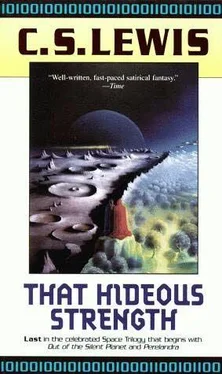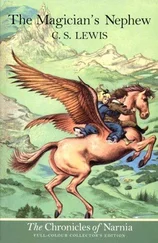Clive Lewis - That Hideous Strength
Здесь есть возможность читать онлайн «Clive Lewis - That Hideous Strength» — ознакомительный отрывок электронной книги совершенно бесплатно, а после прочтения отрывка купить полную версию. В некоторых случаях можно слушать аудио, скачать через торрент в формате fb2 и присутствует краткое содержание. Жанр: Религиоведение, Фэнтези, на английском языке. Описание произведения, (предисловие) а так же отзывы посетителей доступны на портале библиотеки ЛибКат.
- Название:That Hideous Strength
- Автор:
- Жанр:
- Год:неизвестен
- ISBN:нет данных
- Рейтинг книги:5 / 5. Голосов: 1
-
Избранное:Добавить в избранное
- Отзывы:
-
Ваша оценка:
- 100
- 1
- 2
- 3
- 4
- 5
That Hideous Strength: краткое содержание, описание и аннотация
Предлагаем к чтению аннотацию, описание, краткое содержание или предисловие (зависит от того, что написал сам автор книги «That Hideous Strength»). Если вы не нашли необходимую информацию о книге — напишите в комментариях, мы постараемся отыскать её.
That Hideous Strength — читать онлайн ознакомительный отрывок
Ниже представлен текст книги, разбитый по страницам. Система сохранения места последней прочитанной страницы, позволяет с удобством читать онлайн бесплатно книгу «That Hideous Strength», без необходимости каждый раз заново искать на чём Вы остановились. Поставьте закладку, и сможете в любой момент перейти на страницу, на которой закончили чтение.
Интервал:
Закладка:
Up to a certain point the Director had supposed that the powers for which the enemy hankered were resident in the mere site at Bragdon-for there is an old and widespread belief that locality itself is of importance in such matters. But from Jane’s dream of the cold sleeper he had learned better. It was something much more definite, something located under the soil of Bragdon Wood, something to be discovered by digging. It was, in fact, the body of Merlin. What the eldils had told him about the possibility of such discovery he had received, while they were with him, almost without wonder. It was no wonder to them. In their eyes the normal Tellurian modes of being-engendering and birth and death and decay-which are to us the framework of thought, were no less wonderful than the countless other patterns of being which were continually present to their unsleeping minds. To those high creatures whose activity builds what we call Nature, nothing is “natural.” From their station the essential arbitrariness (so to call it) of every actual creation is ceaselessly visible; for them there are no basic assumptions: all springs with the wilful beauty of a jest or a tune from that miraculous moment of self-limitation wherein the Infinite, rejecting a myriad possibilities, throws out of Himself the positive and elected invention. That a body should lie uncorrupted for fifteen hundred years, did not seem strange to them; they knew worlds where there was no corruption at all. That its individual life should remain latent in it all that time, was to them no more strange: they had seen innumerable different modes in which soul and matter could be combined and separated, separated without loss of reciprocal influence, combined without true incarnation, fused so utterly as to be a third thing, or periodically brought together in a union as short, and as momentous, as the nuptial embrace. It was not as a marvel in natural philosophy, but as an information in time of war that they brought the Director their tidings. Merlin had not died. His life had been hidden, side-tracked, moved out of our one-dimensioned time, for fifteen centuries. But under certain conditions it would return to his body.
They had not told him this till recently because they had not known it. One of Ransom’s greatest difficulties in disputing with MacPhee, who consistently professed to disbelieve the very existence of the eldils, was that MacPhee made the common, but curious assumption that if there are creatures wiser and stronger than man they must be forthwith omniscient and omnipotent. In vain did Ransom endeavour to explain the truth. Doubtless the great beings who now so often came to him had power sufficient to sweep Belbury from the face of England and England from the face of the globe; perhaps to blot the globe itself out of existence. But no power of that kind would be used. Nor had they any direct vision into the minds of men. It was in a different place, and approaching their knowledge from the other side, that they had discovered the state of Merlin: not from inspection of the thing that slept under Bragdon Wood, but from observing a certain unique configuration in that place where those things remain that are taken off time’s mainroad, behind the invisible hedges into the unimaginable fields. Not all the times that are outside the present are therefore past or future.
It was this that kept the Director wakeful, with knitted brow, in the small cold hours of that morning when the others had left him. There was no doubt in his mind now that the enemy had bought Bragdon to find Merlin: and if they found him they would re-awake him. The old Druid would inevitably cast in his lot with the new planners-what could prevent his doing so? A junction would be effected between two kinds of power which between them would determine the fate of our planet. Doubtless that had been the will of the Dark-Eldils for centuries. The physical sciences, good and innocent in themselves, had already, even in Ransom’s own time, begun to be warped, had been subtly manoeuvred in a certain direction. Despair of objective truth had been increasingly insinuated into the scientists; indifference to it, and a concentration upon mere power, had been the result. Babble about the elan vital and flirtations with pan-psychism were bidding fair to restore the Anima Mundi of the magicians. Dreams of the far future destiny of man were dragging up from its shallow and unquiet grave the old dream of Man as God. The very experiences of the dissecting-room and the pathological laboratory were breeding a conviction that the stifling of all deep-set repugnances was the first essential for progress. And now all this had reached the stage at which its dark contrivers thought they could safely begin to bend it back so that it would meet that other and earlier kind of power. Indeed, they were choosing the first moment at which this could have been done. You could not have done it with nineteenth-century scientists. Their firm objective materialism would have excluded it from their minds; and even if they could have been made to believe, their inherited morality would have kept them from touching dirt. MacPhee was a survivor from that tradition. It was different now. Perhaps few or none of the people at Belbury knew what was happening: but once it happened, they would be like straw in fire. What should they find incredible, since they believed no longer in a rational universe? What should they regard as too obscene, since they held that all morality was a mere subjective by-product of the physical and economic situations of men? The time was ripe. From the point of view which is accepted in hell, the whole history of our Earth had led up to this moment. There was now at last a real chance for fallen Man to shake off that limitation of his powers which mercy had imposed upon him as a protection from the full results of his fall. If this succeeded, hell would be at last incarnate. Bad men, while still in the body, still crawling on this little globe, would enter that state which, heretofore, they had entered only after death, would have the diuturnity and power of evil spirits. Nature, all over the globe of Tellus, would become their slave: and of that dominion no end, before the end of time itself, could be certainly foreseen.
Ten
I
UP till now, whatever his days had been like, Mark had usually slept well: this night, sleep failed him. He had not written to Jane; he had spent the day keeping out of sight and doing nothing in particular. The wakeful night moved all his fears on to a new level. He was, of course, a materialist in theory: and, also in theory, he was past the age at which one can have night fears. But now, as the wind rattled his window hour after hour, he felt the nursery terrors again: the old exquisite thrill, as of cold fingers delicately travelling down his back. Materialism is in fact no protection. Those who seek it in that hope (they are not a negligible class) will be disappointed. The thing you fear is impossible. Well and good. Can you therefore cease to fear it? Not here and now. And what then? If you must see ghosts it is better not to disbelieve in them.
He was called earlier than usual, and with his tea came a note. The Deputy Director sent his compliments and must ask Mr. Studdock to call on him instantly about a most urgent and distressing matter. Mark dressed and obeyed.
In Wither’s room he found Wither and Miss Hardcastle. To Mark’s surprise and, momentarily, to his relief Wither showed no recollection of their last meeting. Indeed, his manner was genial, even deferential, though extremely grave.
“Good morning, good morning, Mr. Studdock,” he said. “It is with the greatest regret that I-er-in short, I would not have kept you from your breakfast unless I had felt that in your own interests you should be placed in full possession o? the facts at the earliest possible moment. You will of course regard all that I am about to say as strictly confidential. The matter is a distressing or at least an embarrassing one. I feel sure that as the conversation proceeds (pray be seated, Mr. Studdock) you will realise in your present situation how very wise we have been in securing from the outset a police force-to give it that rather unfortunate name-of our own.”
Читать дальшеИнтервал:
Закладка:
Похожие книги на «That Hideous Strength»
Представляем Вашему вниманию похожие книги на «That Hideous Strength» списком для выбора. Мы отобрали схожую по названию и смыслу литературу в надежде предоставить читателям больше вариантов отыскать новые, интересные, ещё непрочитанные произведения.
Обсуждение, отзывы о книге «That Hideous Strength» и просто собственные мнения читателей. Оставьте ваши комментарии, напишите, что Вы думаете о произведении, его смысле или главных героях. Укажите что конкретно понравилось, а что нет, и почему Вы так считаете.












